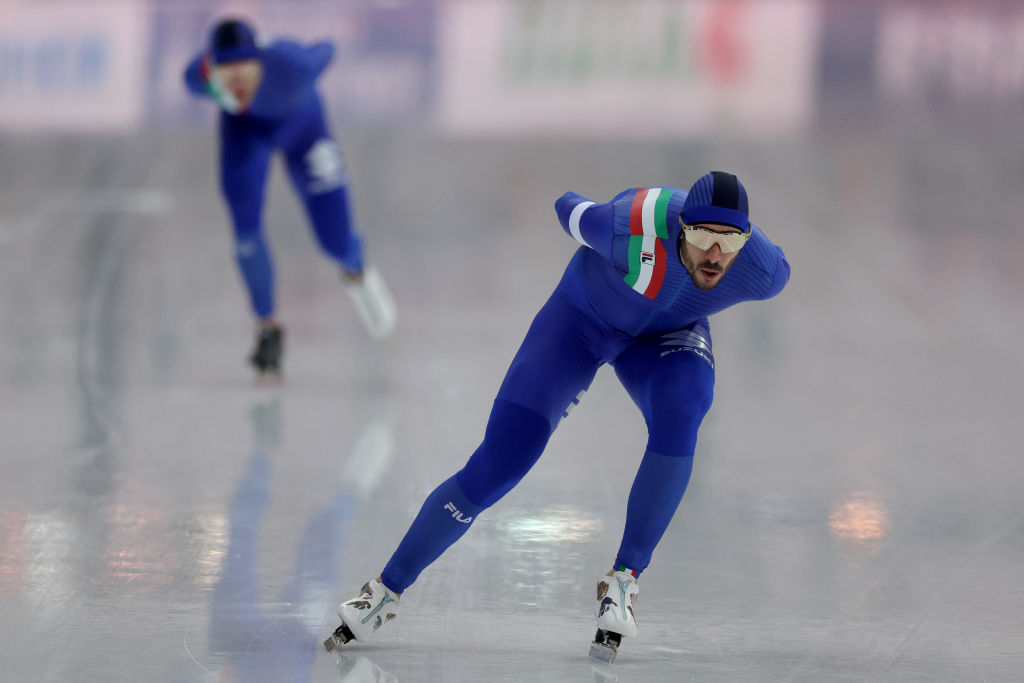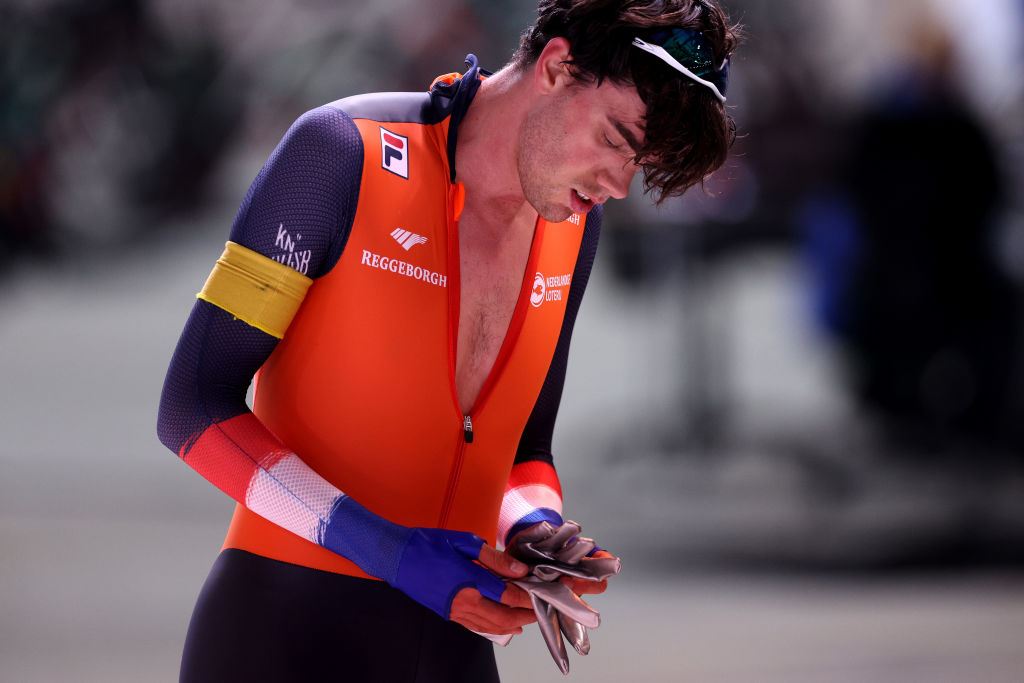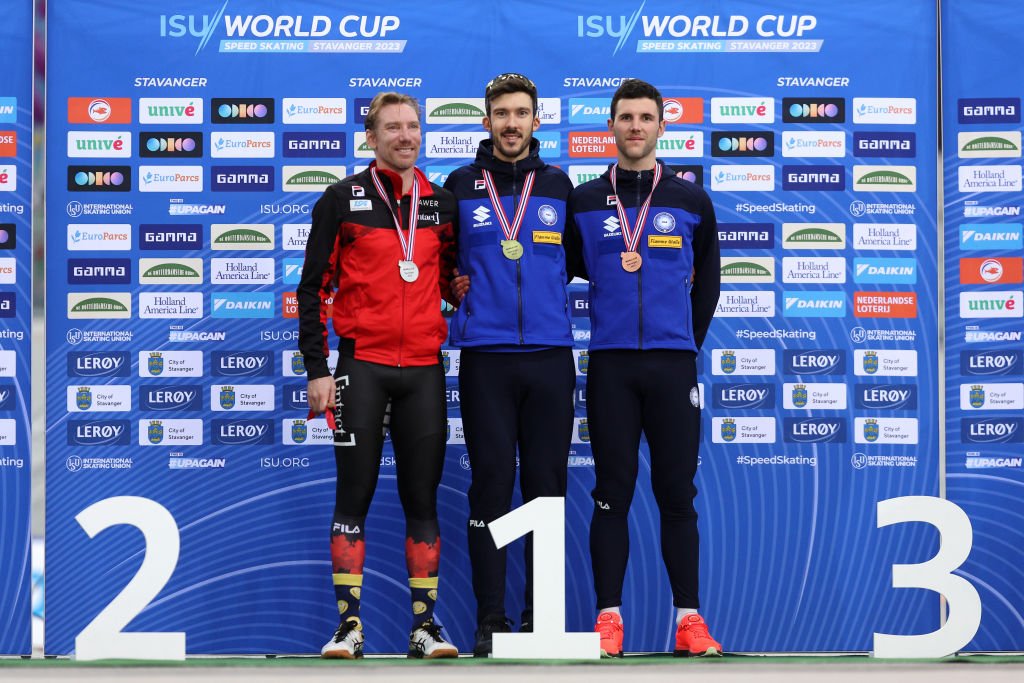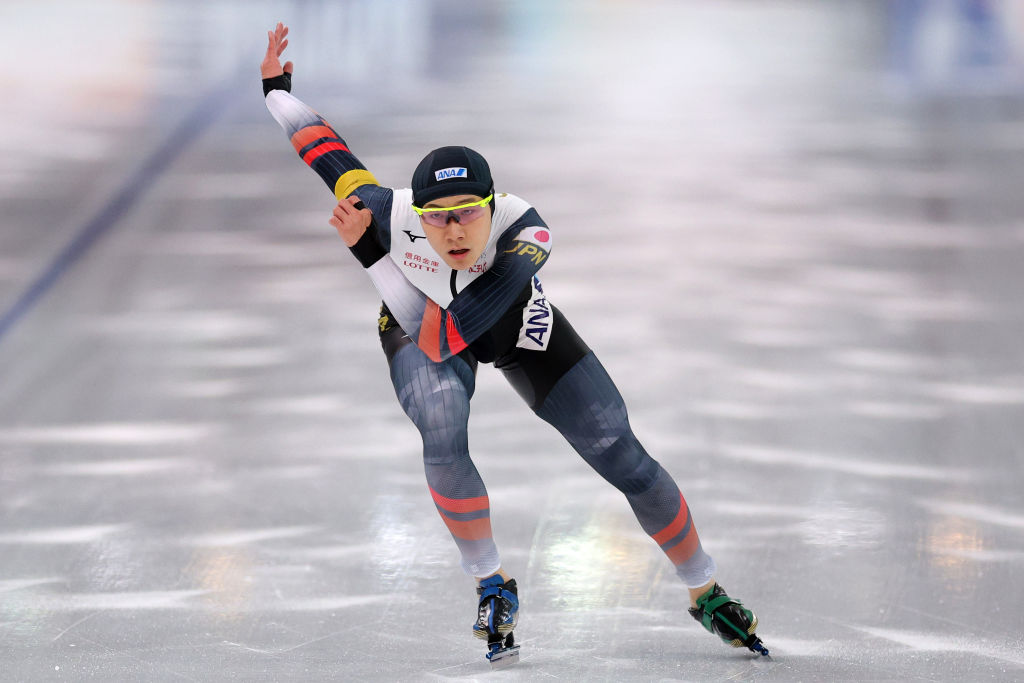Davide Ghiotto and Michele Malfatti (both ITA) jumped for joy after they won gold and bronze in the men’s 10,000m at the ISU World Cup in Stavanger on Saturday. Ghiotto took a firm lead in the long-distance World Cup ranking, while his team-mate celebrated a career first individual World Cup podium. Ted-Jan Bloemen (CAN) took silver, while Patrick Roest’s (NED) World Cup lead collapsed after a failed all-or-nothing effort. Earlier on Saturday, Wataru Morishige (JPN) took his fourth consecutive 500m World Cup win.
Ghiotto skates like clockwork
After former Olympic and three-time World 10,000m champion Jorrit Bergsma (NED) had set a mark at 13 minutes and 16.88s in the second pairing of the longest distance, Ghiotto knew what to do. The Italian faced teammate Malfatti in the first pairing after the ice-cleaning break. Roest and Bloemen were due up in the next heat.
“I saw Bergsma’s time and I chose to stay within his time, maybe a little bit faster, with 31.1s and 31.2s laps. And in the second part [of the race], I wanted to go under 31s, because I knew Patrick [Roest] would start after me and he is very fast in the second part of the race.”

Davide Ghiotto (ITA) chased down the time of Jorrit Bergsma (NED) to take 10,000m gold. Pair-mate Michele Malfatti (ITA) took bronze © ISU
Ghiotto stuck to his plan like clockwork. He skated 31.1 and 31.2 laps on average up until the 15th of 25 laps and then accelerated to sub-31 laps. Finishing in 13:02.71, he beat Bergsma’s time by 14.17s.
Malfatti stopped the clock at 13:12.89 to take provisional second place on the leaderboard.
Roest goes for broke
Bloemen and Roest knew that Ghiotto’s time was going to be a tough nut to crack. The Canadian took the initiative, but both Bloemen and Roest were behind Ghiotto’s split times from the very start of the race.
With 10 laps to go, Roest decided to speed up. “I knew that if I skated 30.5 lap times from then on, I would be able to beat Ghiotto’s time,” he said. “But I exploded straight away.”
Roest managed to skate two sub-31s laps, before he saw the lap times going up to 32s, 33s, and eventually even 35s over the final three laps. He finished 21.25s behind Ghiotto in eighth place.

A despondent Patrick Roest (NED) regretted going all-in to catch Ghiotto, who took his place at the top of the World Cup rankings © ISU
“I accelerated too soon to try and reach Ghiotto’s time, maybe even against my better judgement, because it just was not feasible today," said Roest.
"It’s a shame, because it cost me a lot of points in the World Cup ranking and even if winning isn’t possible, if I just skate a sensible race, I could make it to the podium.”
Bloemen took full advantage.
“I just skated my own race, and at some point he [Roest] got past me so fast,” said the 2018 Olympic champion.
That was difficult. I had to stay focused on my own technique. I managed to stay in my own zone, and then all of a sudden Bart [coach Bart Schouten, NED] started shouting at me, and I saw that I closed in on Patrick again.”
Bloemen quickly left Roest far behind and knew that he had Malfatti’s time in sight.
“But it was a constant fight to keep up those lap times, because the conditions were very tough out there today.”
Eventually Bloemen edged out Malfatti by 0.56s to capture the silver medal, but he was happy to see that neither Sverre Lunde Pedersen (NOR) and Sander Eitrem (NOR) managed to push the Itallian off his career-first World Cup podium.
“It’s great to see Malfatti up there,” Bloemen said. “I’ve had some good battles with him in the two previous 5000m races at the World Cup this season. He’s made good progression and I’m really happy for him.”

Ted-Jan Bloemen (CAN, left) split the Italians to take silver but was pleased to share the podium with first-time medalist Malfatti (right) © ISU
Ghiotto was very happy for his long-time teammate too, lifting Malfatti up in the air after he was sure that he had got the bronze.
“It’s not been easy for him,” Ghiotto said. “Every time we have a competition and he has a good race, he’s close to the podium, so I’m very happy for him that he finally makes it.”
For Malfatti himself, Ghiotto’s long-distance successes have given him a good example to follow.
“Davide is an inspiration for me because he's fighting for the top position for some years. Working with him every day is an inspiration to grow and to get better.”
Morishige makes it four in a row
Wataru Morishige (JPN) is the man to beat in the 500m this World Cup season. After coming second behind Tatsuya Shinhama (JPN) in the first race of the World Cup series, the 23-year-old from Obihiro has now won four races in a row.
In Stavanger, the margin of victory was about as narrow as it can get. Olympic Champion Gao Tingyu (CHN) set a time of 34.66s after posting the fastest opener of the field in 9.48s. With 9.66s, Morishige was a bit slower in the opener, but he clocked the fastest full lap of the field in 25.0s to beat Gao by just 0.01s. Shinhama finished third in 34.71s.

Wataru Morishige (JPN) won his fourth World Cup 500m race in a row, beating Gao Tingyu (CHN) by just 0.01s © ISU
The race had gone according to plan, said Morishige.
“I expected it to be a hard day, because I know he [Gao] is very fast in the opener. I knew if I could stay close, I would be able to beat him with a faster lap.
“I’m very happy to be on top of the World Cup ranking at the moment, but there’s three more World Cups to come, so anything can happen, but winning the overall ranking would be a dream.”
For all information about the ISU World Cup Speed Skating Series, please visit the webpage here.
World Cup Standings - Men
World Cup Standings - Women
All Media Accreditations details and deadlines for the ISU World Cup Short Track Speed Skating Series can be found here.
Where to watch
Viewers will be able to watch the World Cup sessions via their national broadcaster/channel.
For countries where there are no broadcasters, the ISU will offer a live stream with English commentary on the Skating ISU YouTube Channel. You will find the full list on the Where to watch webpage here.
Subscribe to the ISU YouTube Channel to receive all the latest videos and follow the conversation with #SpeedSkating.
ISU World Cup Short Track Speed Skating Series events 2023/24:
Nov 10 - 12, 2023 Obihiro /JPN
Nov 17 - 19, 2023 Beijing /CHN
Dec 01 - 03, 2023 Stavanger /NOR
Dec 08 - 10, 2023 Tomaszów Mazowiecki /POL
Jan 26 - 28, 2024 Salt Lake City /USA
Feb 02 - 04, 2024 Québec /CAN
About ISU World Cup Speed Skating Series
The ISU World Cup Speed Skating is a Series of Speed Skating competitions which have taken place annually since 1984. The series comprises six events (four during an Olympic season), with A Division and B Division races. Skaters can earn points at each competition, and the Skater with the most points on a given distance at the end of the series is the World Cup winner in that distance. The four World Cup Competitions held from November to December serve as qualifying events for entry quotas at the ISU European Championships, and the ISU Four Continents Championships. The whole series of six events serves as qualifying events for the World Single Distances Championships, and/or the World Sprint and Allround Speed Skating Championships.
World Cup titles are awarded in 500m, 1000m, 1500m, combined 5000m/10,000m, and Mass Start for men, and 500m, 1000m, 1500m, the combined 3000m/5000m, and Mass Start for women. Both genders also compete for the World Cup titles in Team Pursuit and Team Sprint. New in the 2023/24 program is the Mixed Gender Relay over six laps, in which teams of one man and one woman compete.
(For full explanation of this season’s ISU World Cup (entry rules, formats, qualifying, and prizes: https://www.isu.org/speed-skating/rules/ssk-communications/31562-isu-communication-2587/file)

